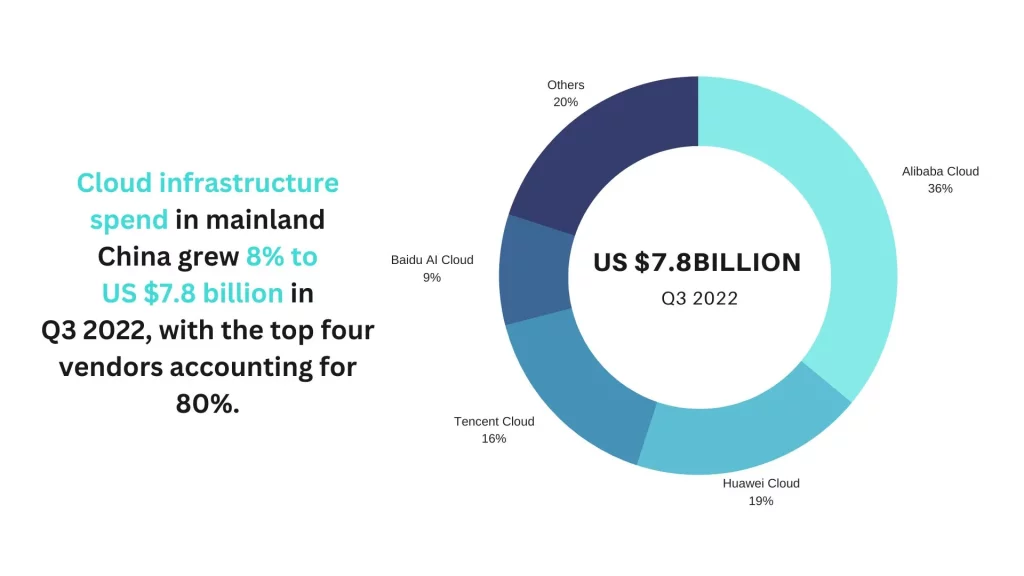

China has done tremendous development and has succeeded to digitize its business system with groundbreaking results. During the current uncertain condition of the pandemic, the economy of almost all the countries has been badly suffered in different sectors where China has reached a record of 4.3 billion US dollars in 2020 and 7.3 billion US dollars in 2022 due to its cloud infrastructure services. People in China are now eager for cloud technology and it has been increasing by leaps and bounds. Specifically, cloud technology refers to networking, storage, computing, databases, machine learning, containers, etc. hosted on the cloud and accessible from the internet.
There are many reasons why cloud technologies are imperative and most demanding within China. The growing demand for cloud technologies has increased domestically as well as internationally. The first reason is that China has the largest online population and internet users are millions. Similarly, they have aimed to get a well-organized, simple, and stable cloud environment. Secondly, China has the largest market with greater opportunities where people wish to benefit from cloud services to bring visible change and development in businesses. Because they believe that cloud services focus on helping enterprises with digital transformation with innovative technologies and products. Thirdly, the majority of people find cloud computing platforms secure for companies and businesses and offers very high reliability, availability, and durability for the data stored on the cloud. Fourthly, the central file storage system makes an easy platform for interdepartmental documents. Therefore, the users found it easy to undertake cloud technologies on a very large scale.
There are several cloud service providers that are functional in China such as Alibaba Cloud, Tencent Cloud, Huawei Cloud, AWS China, Azure China, Baidu AI Cloud, and others.
The American cloud service providers, Amazon Web Services (AWS) and Microsoft Azure are present in the Chinese cloud market. However, both are operated by local service providers. AWS and Azure have collaborated with Chinese companies to accomplish China’s regulatory and legal requirements. The Chinese cloud services providers such as Alibaba Cloud, Tencent Cloud, and Huawei Cloud are growing very fast in China, but also outside of China as they are expanding to other markets.
Undoubtedly it’s very much clear that business in China has been rapidly increasing and everyone has their eyes on the Chinese cloud services to boost their businesses on a vast scale. It seems that in this modern era, cloud providers have reduced the risk of financial losses and the business is now much more secure. Many reports have shown that China’s market will reach 686.6 billion Yuan in 2020 and this would be a quarter of the projected worldwide market of 411 billion dollars. However, the statistics show that China is a great business opportunity and international companies are moving to the Chinese cloud.
Based on the Canalys China Public Cloud Service Tracker report of 2022 Q3, Alibaba Cloud is the largest cloud service provider in China with a 36% market share, followed by Huawei Cloud with a 19% market share, Tencent Cloud in the 3rd position with 16% market share and Baidu AI Cloud is the 4th largest cloud service provider with a 9% market share. However, these are the top cloud service providers, and they all control around 80% of the market share in China.
Source: Canalys China Public Cloud Service Tracker report of 2022 Q3
For the operational requirements, the cloud providers must make it possible that the users to provide valid identity information during the verification process to get access to the cloud services. The identity verification includes real name, valid contact information, company name, and business license. If the company does not have any legal unit within China, we can provide support by fulfilling the verification mechanism on behalf of the customer. In this regard, Chinese law is very clear that the individual can’t get access to cloud services if the client fails to obtain an operating license. Furthermore, in accordance with the China Ministry of Industry and Information Technology, internet content providers must take permits through their hosting providers. The domain would not be functional without an ICP license and/or ICP filling.
In China, there are clear laws and regulations for migrating and managing cloud technologies for business purposes. The data centers are not directly connected internationally. In short, China doesn’t allow foreign cloud service providers to operate their data in China. According to Chinese laws and regulations, foreigners can only operate the data in China. They need to obtain a value-added telecom permit and foreign entrepreneurs need a separate user account to get access to their business personnel in China. This is the reason why AWS and Azure are collaborating with Chinese companies to operate their platform.
In addition, there are some issues and challenges faced by foreign investors while using cloud services in China. Firstly, the payment mechanism from overseas customers to cloud services provider in China is a little inconvenient. The cloud service in China only admits payments made by RMB which is troublesome, especially for foreign companies with no legal entity in China. Additionally, there are some extra compliance requirements that are mandatory, especially for foreign companies who wish to run a website in China to serve customers in China.
The Chinese cloud market is very vast and increasing very fast. In my opinion and based on the statistics, the Chinese cloud market will become the largest in the near future.
Additionally, Chinese cloud services providers such as Alibaba Cloud, Tencent Cloud, and Huawei Cloud are expanding rapidly to other markets in Asia, Europe, and even America. On the other hand, cloud platforms not only allow businesses to save money but also provide innovation and digitalization, which is crucial for businesses nowadays.

Pablo is an IT professional specializing in cloud computing technologies for the past 7 years. With a special focus into the China market and the Chinese technologies, he has been supporting international businesses on their cloud journey to China. Pablo has received multiple awards and recognitions from AWS, Alibaba Cloud, and Tencent Cloud for his knowledge and success delivering solutions to customers.

For many international businesses with a presence in China, network stability issues are often the biggest concern...

AWS China comprises 2 AWS regions, Beijing and Ningxia, with 6 availability zones in total. Beijing is operated by...

AWS China announced the availability of AWS Organizations in the Beijing and Ningxia regions in 2020. Before we deep...

Microsoft Azure is a cloud computing platform and infrastructure created by Microsoft for building, deploying, and...

The AWS Marketplace China is an online platform operated by AWS China that covers products in both AWS China regions...

Microsoft Azure is a popular cloud computing platform that offers various services to support organizations in various...

Amazon Web Services (AWS) is a cloud computing platform that provides a wide range of services for building,...

Docker is an open-source platform from the Moby Project that helps package applications into containers and automate...

Azure China is independently operated and transacted by 21Vianet. Microsoft Azure services are running in 6 regions in...

AWS China is independently operated and transacted by two local partners: Sinnet and NWCD. AWS services are running in...

Running containerized applications in the cloud is no longer optional but a requirement. Given the elasticity and...

Microsoft Azure is a cloud computing platform and infrastructure created by Microsoft for building, deploying, and...

Amazon Web Services (AWS) is a cloud computing platform that offers a wide range of services such as computing,...

Follow the next steps to book a Tencent Cloud certification exam: 1. Sign up directly on Kryterion through this...

Adopting an Alibaba Cloud multi-account strategy can provide many benefits without a lot of extra effort. Alibaba...

Amazon Web Services (AWS) is one of the most widely used cloud computing platforms globally. With its extensive range...

Microsoft Azure is one of the leading cloud computing platforms in the world, offering businesses and organizations a...

Azure maintains multiple geographies to anticipate disaster recovery and data residency boundaries across its regions....

AWS is the biggest cloud provider worldwide constantly improving its platform and expanding its services globally....

Tencent Cloud is one of China’s biggest public cloud service providers leveraging its global infrastructure to...

Alibaba Cloud was named by IDC as the world’s fastest-growing provider in the global public cloud market. Global...

Microsoft Azure China was officially launched in 2014 and was the first international public cloud provider to bring...

AWS Global and AWS China are two different regions that provide similar but different services to their respective...

People are now technologically so advanced and innovative, new groundbreaking ideas have brought visible changes in...

Alibaba Cloud, also known as Aliyun, is a Chinese cloud computing company, which was officially launched in 2009....

Microsoft Azure is a cloud computing service provider for building, testing, deploying, and managing applications and...

Amazon Web Services (AWS) is a cloud-based platform that provides a reliable and cost-effective infrastructure to...

Managed Cloud Services in China: Advantages and Opportunities As the Global Director of Cloud Solutions, I have seen...

Managing Cloud Operations in China: Centralization or Localization? A Cloud Center of Excellence (CCOE) is a team that...

Hybrid cloud is a combination of public and private cloud services that are used together to provide the best possible...

The use of Cloud Computing is rapidly growing in China, with more and more companies shifting their operations to the...

Supporting European Companies on Their Cloud Journey to China The cloud computing market in China is growing rapidly,...

The cloud computing market in China has been growing rapidly, with an estimated growth rate of over 20% annually. As a...

Cloud hosting has been a transformative technology for businesses around the world. It has allowed companies of all...

Getting a cloud account globally takes minutes, in China it can take up to months. It is not straight-forward and not...

Public Cloud Adoption in China Cloud strategy is defined as a business plan to adopt cloud technologies into the...

Cloud Services Providers in China When entering the Chinese cloud market, one of the first decisions is to...

In today's fast-changing world, businesses are no longer limited by borders. Thanks to advanced technology and the...

As organizations look to expand their operations in the Chinese market, adopting a hybrid cloud environment that...

For many international businesses with a presence in China, network stability issues are often the biggest concern...

AWS China comprises 2 AWS regions, Beijing and Ningxia, with 6 availability zones in total. Beijing is operated by...

As businesses increasingly move their operations to the cloud, it becomes essential to have a well-designed and...
Let our experts design, develop, deploy and manage your requirements while you focus on what's important for your business
Please check your inbox for more details.
| Cookie | Duration | Description |
|---|---|---|
| cookielawinfo-checkbox-analytics | 11 months | This cookie is set by GDPR Cookie Consent plugin. The cookie is used to store the user consent for the cookies in the category "Analytics". |
| cookielawinfo-checkbox-functional | 11 months | The cookie is set by GDPR cookie consent to record the user consent for the cookies in the category "Functional". |
| cookielawinfo-checkbox-necessary | 11 months | This cookie is set by GDPR Cookie Consent plugin. The cookies is used to store the user consent for the cookies in the category "Necessary". |
| cookielawinfo-checkbox-others | 11 months | This cookie is set by GDPR Cookie Consent plugin. The cookie is used to store the user consent for the cookies in the category "Other. |
| cookielawinfo-checkbox-performance | 11 months | This cookie is set by GDPR Cookie Consent plugin. The cookie is used to store the user consent for the cookies in the category "Performance". |
| viewed_cookie_policy | 11 months | The cookie is set by the GDPR Cookie Consent plugin and is used to store whether or not user has consented to the use of cookies. It does not store any personal data. |

